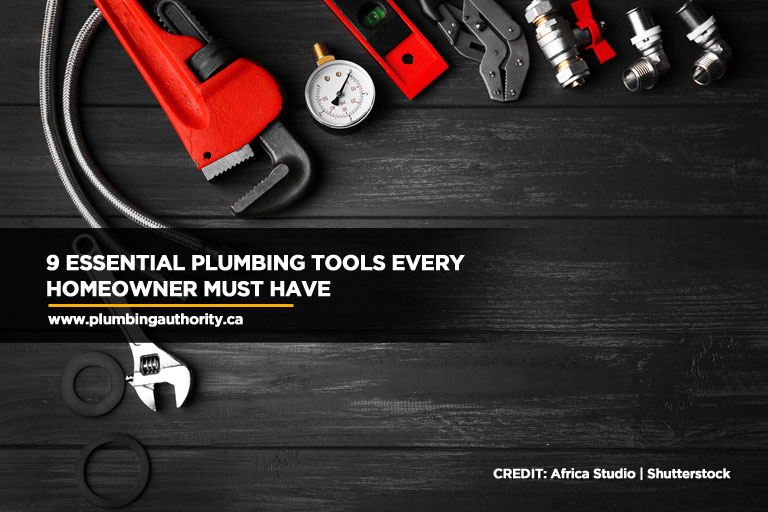
A good and reliable plumbing system is an essential part of your home. Every day, it supplies us with clean water to drink, shower, and wash the dishes and laundry. Unfortunately, many homeowners overlook the importance of a well-functioning
plumbing system until a disaster arises.
Make sure your prepared to meet any plumbing challenges by having the right tools.
Most Common Home Plumbing Issue
Every homeowner experiences plumbing problems from time to time. These problems come in different shapes and sizes. While the most common issues are due to old fixtures or normal wear and tear, others stemm from poor or lack of maintenance.
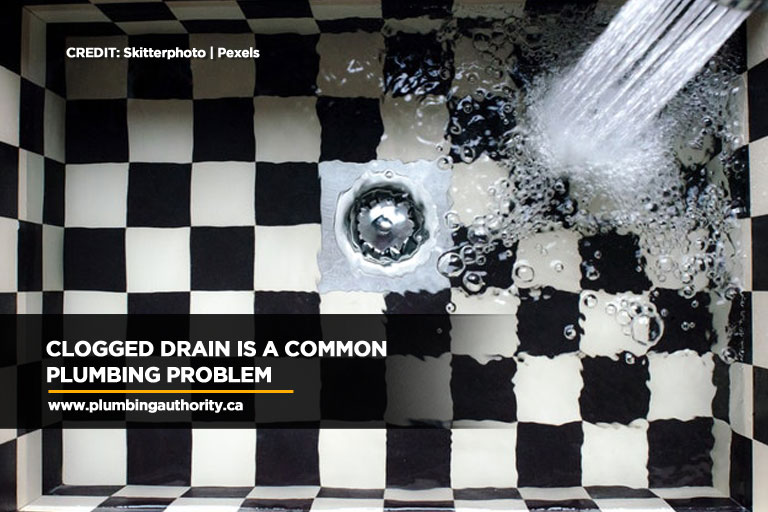
- Clogged Drains
Almost all homeowners experience a clogged drain every once and a while. The clogged kitchen sink or slow draining bathroom is usually caused by food scraps, grease, mineral buildup, soap suds, and hair, while the clog in your toilet can be caused by flushable materials, dirt, and small materials. Luckily, clogging problems can be easily resolved using a plunger, drain snake, or drain auger to remove the blockage and restore the proper flow of wastewater into the drain pipe.
- Dripping Faucet
A dripping faucet may seem like a minor plumbing problem but it is more than a nuisance and a waste of money. The drips can result in wasted gallons of water and add up quickly to your utility bills. Dripping faucets can be easily detected since you can see and hear the water trickling down the faucet even if it is turned off. In most cases, the problem is caused by a worn-out pipe, corrosion, or improper installation of the faucet. Luckily, a dripping faucet can be easily repaired as long as you have the proper plumbing tools on hand.
- Running Toilet
A running toilet is a wasteful version of a dripping faucet problem. A simple leak in your toilet can quickly drive up the cost of utilities and when ignored, a running toilet can lead to serious and costly water damage. Some of the most common causes of toilet leaks include:
-
- Flapper seal failure
- Leaky fill valve
- Length of the flapper chain
- Broken toilet handle
To check for leaks, simply add food colouring in the upper tank and check if the colouring makes its way to the bowl without flushing.
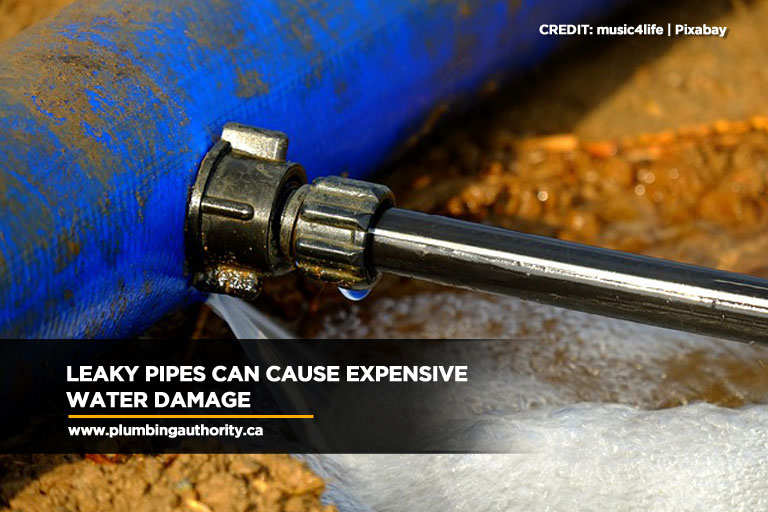
- Leaky Pipes
A simple leak from your kitchen sink can be more than a nuisance. A leaky pipe is a major plumbing problem that needs to be fixed immediately to prevent costly water damage and dampness that creates a thriving environment for bugs and mould. The leak often occurs at the pipe joints. You will need plumbing tape, compounds, and fillers to temporarily fix the problem. However, replacing old pipes and other related fittings can resolve the problem permanently.
- Jammed Garbage Disposal
Garbage disposals are an essential kitchen appliance in every house. However, bad practices, such as running them without water, putting silverware inside, and disposing of food scraps and fruit and vegetable peelings can cause garbage disposal problems.
Plumbing Tools You Should Keep in Your Home
Homeowners are bound to encounter several plumbing issues, such as dripping pipes, leaky pipes, and clogged sinks and toilets. While most problems strike without warning, it pays to be prepare by having the tools used for basic plumbing repairs.
Here are the must-have plumbing tools to keep in your toolbox:
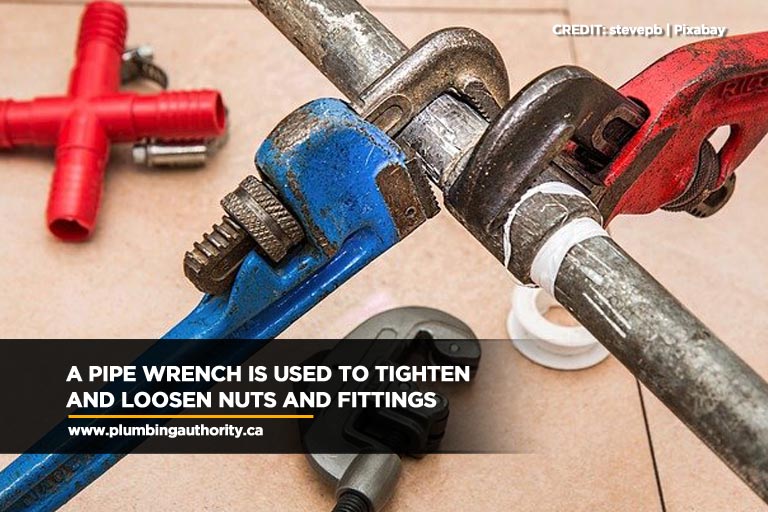
- Pipe Wrench
This plumbing tool is larger and heavier than the adjustable wrench. It is used to tighten and loosen nuts and fittings. However, you should keep 2 pipe wrenches in your plumbing tools kit—one for turning nut and the second for holding the pipe. When using the wrench, do not forget to cover the jaw with a piece of cloth to protect fixtures from scratches.
- Plumbing Tape
Also called Teflon tape, this thin white tape material is wrapped around pipe and fitting threads to fix leaks. It also improves the lubrication that aids threading and seals the joint to stop the water from leaking.
- Channel-Type Pliers
Although channel-type pliers (also known as slip-joint pliers) are similar to adjustable pliers, they come with extended adjustment sections and angled jaws, which enable you to grip pipes and other plumbing parts. Its long handles enable better squeezing and twisting, as well as gripping heavy steel pipes or gently tighten large plastic nuts on sink drains.
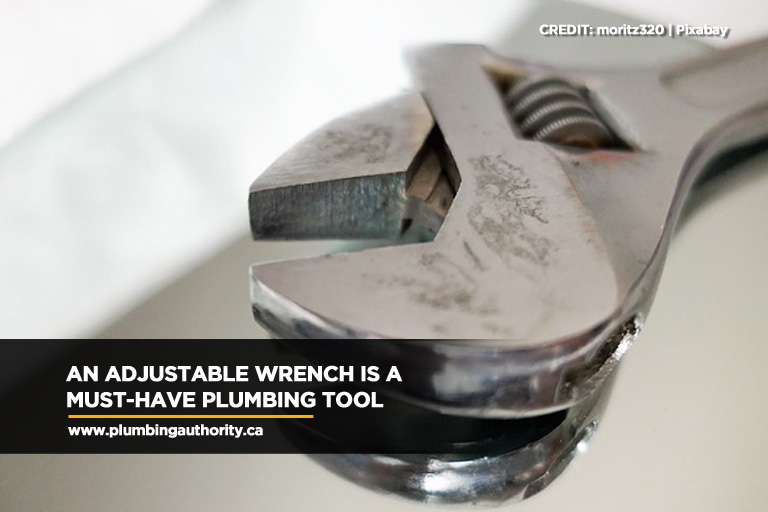
- Adjustable Wrench
Adjustable wrench is an ideal plumbing tool used for dealing with hexagonal-shaped nuts and handling supply lines and compression fittings. It allows you to adjust the size of the grip to fit a different range of fittings and lock the jaw into place to prevent slipping while you do some plumbing work. 6-inch and 10-inch adjustable wrench models ensure greater flexibility. A 6-inch wrench works perfectly well in cramped spaces, such as under the kitchen sink bench, while a 10-inch model provides you with greater reach.
- Plunger
Perhaps the most common plumbing tool you can find in every home. Plungers help remove clogs in toilets and shower drains, too. You can easily purchase this inexpensive plumbing tool in the market.
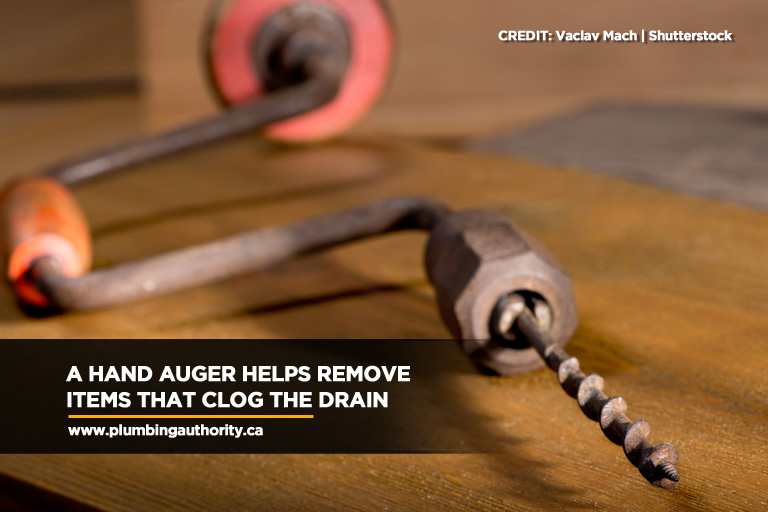
- Hand Drain Auger
The hand auger is another important drain unclogger tool that is commonly used to remove the blockage in the drain pipe. It is a good substitute if the plunger fails to remove the clog from the drain. It has a hand crank that you can use to push the metal wire through the drain to get rid of the blockage.
- Heavy-Duty Rubber Gloves –
It is important to wear rubber gloves when working on pipes and plumbing to keep your hands, wrists, and forearms clean and protected from sharp materials.
- Hacksaw
A good-quality hacksaw is essential for cutting plastic and metallic pipes, bolts, nuts, and screws. Make sure to keep extra blades in case the hacksaw blade becomes dull or breaks suddenly. Use a sturdy blade to make cutting through metal hardware easier.
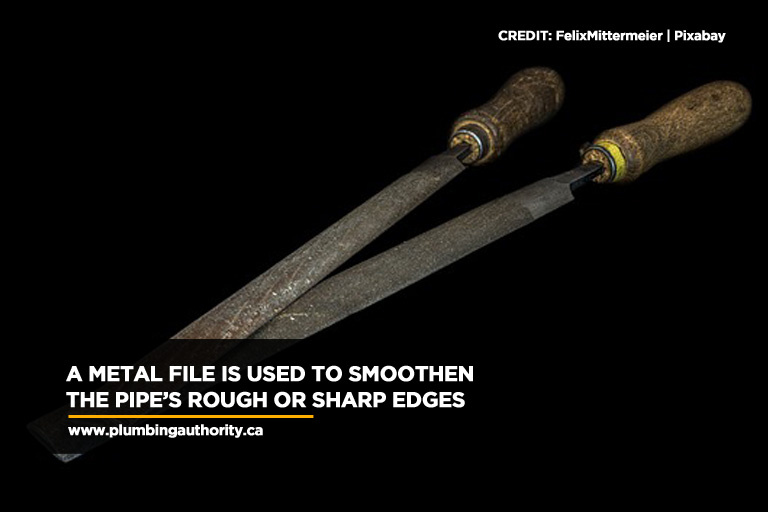
- Metal File
After cutting pipes and other hardware, use a metal file to smoothen out rough or sharp edges and avoid cutting yourself while doing some plumbing repairs. While it comes in many sizes and forms, make sure to keep a half-round file and a tapered round rat-tail file in your plumbing box. Both can be useful for different household plumbing works.
When to Call a Professional Plumber
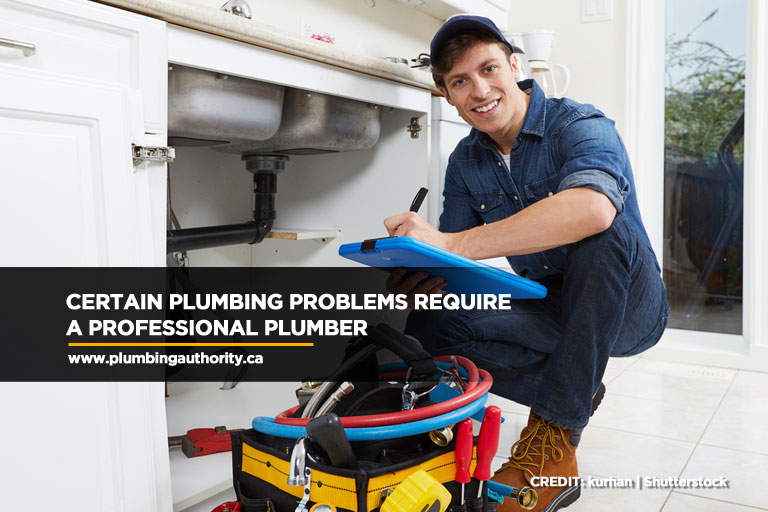
Certain plumbing jobs and problems can be simple enough to be carried out by a novice with little or no risk involved. Fixing a dripping faucet, installing a new showerhead, or unclogging a drain are simple DIY projects that any homeowner can successfully complete on their own. However, there are some plumbing problems that are more complex and require extensive work. Knowing where to draw the line between DIY plumbing and calling a professional plumber in King City or in nearby areas can protect your home from serious plumbing disasters.
- Low Water Pressure
It can be annoying to find out that water simply trickles out your faucet. Low water pressure is a common problem in older houses. Several causes for low water pressure are corroded plumbing, clogged water heater piping, and clogged pipes. A professional plumber can assess the situation and come up with the proper courses of action.
- No Hot Water
If the water heater is not producing hot water at all, call a plumber to troubleshoot the issue. This problem may be a serious concern that requires the skills and knowledge of a professional. It can be caused by a leaking hot water tank, broken heating element, a tripped circuit breaker or blown fuse, a bad overload switch, or a malfunctioning thermostat.
- Frozen Pipes
Water freezes when the temperature drops below 32 degrees Fahrenheit, increasing the risk of frozen pipes. When the pipes freeze, they can burst and cause extensive water damage in your home. If you notice a frozen pipe, make sure to immediately shut off the main water valve and open a faucet nearby before thawing the pipe. Inspect the pipe for signs of cracks. If the pipe is already cracked, contact a plumber immediately. Even if there are no cracks on the pipe, it is still important to hire a plumber to replace the frozen section of the pipe rather than thawing it.
- Sewer Line Blockage
If you notice that your drains are constantly clogged, the blockage may run deep in your sewer line. Often, tree roots are the cause of the problem, which is difficult or impossible to remove. Never attempt to remove the roots yourself since this can seriously damage pipes. Leave the job to a licensed plumber. They have the right tools and equipment to resolve the problem.
- Sweating Water Heater
If you notice your water heater sweating or weeping, it indicates a slow but steady leak. The piping or the casing may leak a small amount of water. These small leaks may eventually lead to serious issues. Other signs to look out for include rusty spots on the water heater or the surrounding piping, corrosion, and unusually large pool water in the drip pan or nearby the tank.
Never attempt to repair complex plumbing problems yourself. Do not hesitate to contact a plumber. If you are a resident in King City or nearby, you can count on Plumber Authority for all your plumbing needs 24/7. Our comprehensive services range from plumbing repairs, maintenance to installation. Call us today at (647) 992-7473 to book a free on-site estimation. You can also email us at plumbingauthoritygta@gmail.com or fill in our contact form to send us your message or queries.
Do not settle for less. Take advantage of our superior quality plumbing works at a price you can afford.




